This year, during the period of August 24 and September 6, the fund “Democratic Initiatives” named after Ilko Kucheriv, in cooperation with the Centre of political sociology, have interrogated 1000 residents of Transcarpathian Region.
The respondents were selected so that they represented the population of the whole region by the social and demographic indicators.
Moreover, the research was also unique from a different reason: it involved the greatest national minorities of the region – the Hungarian one, the Romanian one, the Slovakian one and the Roma one.
That is, two sociological selections were created in line with the polling: 500 respondents to represent Transcarpathian region on the whole, and the other 500 represented the national minorities.
Both of the selections have an accidental deviation of polling (without reference to the additional selection in the national minorities and the design effect), not exceeding 4.4% and the probability of 0.95.
This is the first polling in Transcarpathia for the last 10 years conducted on such a scale and with such depth, they stress in the Fund “Democratic Initiatives” named after Ilko Kucheriv.
The research is thoroughly prepared and implemented at all stages, starting from creating the questionary in cooperation with the analysts from the Institute of Central European Strategy, and finishing with conducting the polling itself and its presentation at the forum of Re:Open Zakarpattia. The research was done in line with this very project, with the purpose to learn the following: what Transcarpathians are really troubled with, what they think and dream about, what are the real, not fictional challenges exist in the region. Another aim was to break stereotypes and prejudices.
And here is what we get to know from the research.
An estimation of the social and political situation in the region
Most of the respondents in Transcarpathia consider the political situation in the region quite peaceful. However, no major divergencies among the population on the whole and among the national minorities are observed, except from the fact that among the latter there are a bit more fence-sitters. Still, such an estimation is much more positive than, for example, that in Donbass, where most respondents speak of a tense or critical or explosive situation.
As compared with the polling done in December, 2018, the share of the persons that consider the situation in the region a critical or explosive one has even grown (from 1.6% to 4.2%). But generally speaking, such changes are not drastic, and the perception of the situation in the region is generally calm.
What is your estimation of the political situation in Transcarpathia?
Transcarpathians typically have moderately pessimistic esteems and a generalization of the situation in the region and the country. At the same time, such conception of the situation are common for majority of Ukrainians on the whole. Thus, if we estimate a definite sphere in the social and political life since 2014, the most common will be an estimate of the kind: no principal changes for the better or for the worse. But the number of the negative estimates in most areas exceeds that of positive, which is also typical and not only for this region.
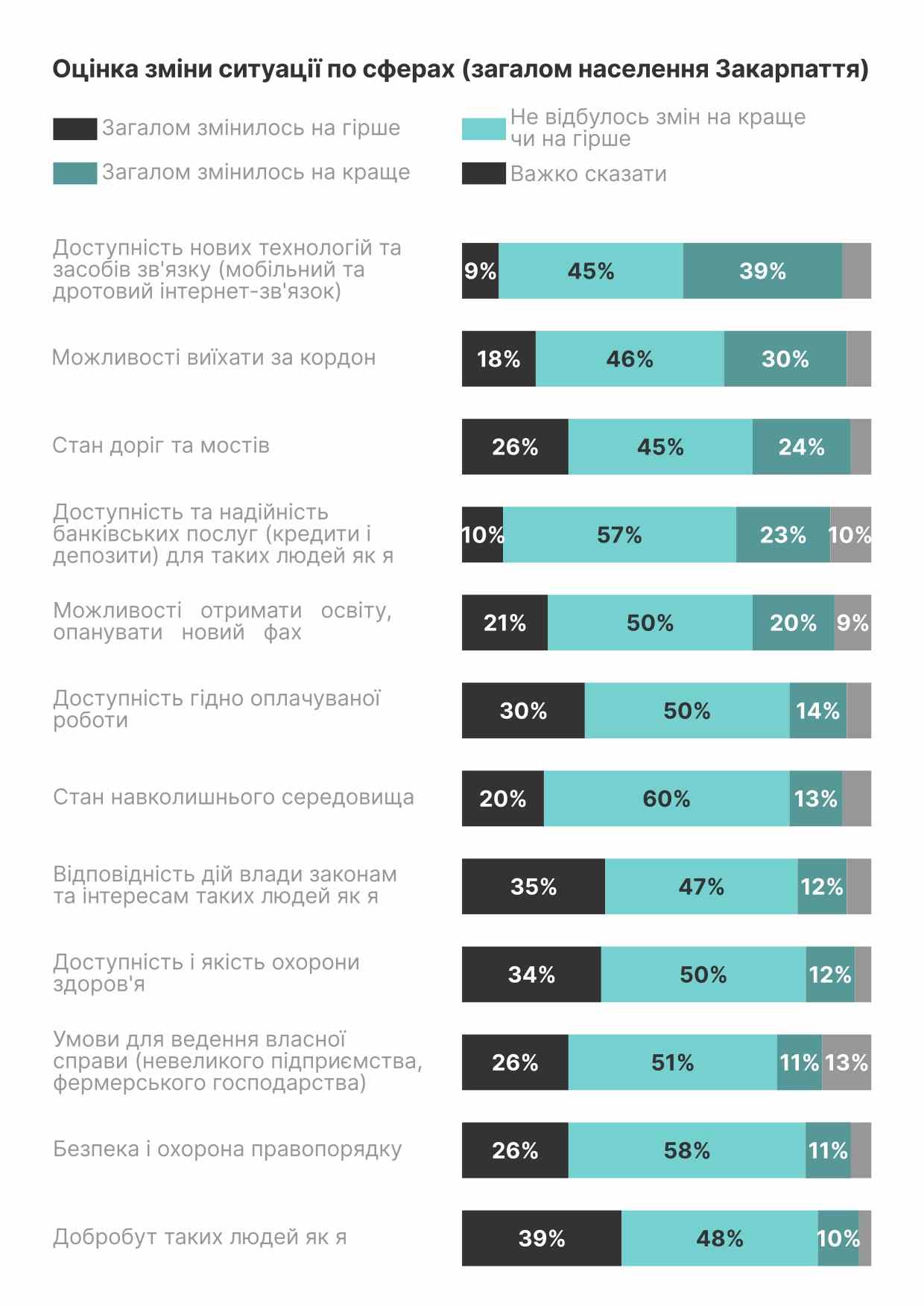
Generally speaking, we may state that there are some divergencies in the perception of the situation change by fields among the population of Transcarpathia on the whole and in the environment of the national minorities of the region. Thus, among the latter we may observe a higher level of pessimism and a higher level of incertainty, which may be illustrative of a lower concernment and a lesser participation in the social and political events. Such a result may be partly formed due to lack of inclusion and exclusion from the social and political life.
Moreover, estimates by Transcarpathian population in general and those by the region’s national minorities have significant differences in some fields. Thus, among the national minorities much lower estimates of the state of roads and bridges can be observed as compared to those among the population in general. A similar situation exists in respect to the esteem of the freedom of enterprise and that of the authorities’ actions in relation to the laws and interests of plain people. However, the most critical differences are observed in the esteems of availability and quality of the healthcare system. Transcarpathia’s population already gives a negative estimate to the changes in this component, and among the national minorities this indicator is even more pessimistic.
The respondents’ esteems varied in respect to the perspectives of the region development. Thus, 37% consider that the situation in the region will gradually improve. Some 39% consider that no major changes will take place and yet 14% are of the opinion that the situation will be changing for the worse in the future. In the environment of the national minorities, we may state similar opinions, except for the fact that over a third of the total number of the respondents could not give their forecast to the situation at all. Among the general selection each tenth could not answer the question.
In what way, to your mind, will Transcarpathia change in the next 2-3 years? (One answer)
By analyzing possible risks, we may state that the relatively stable situation in Transcarpathia may be broken with an acute economic crisis – almost a half of the pollees think so. Among the national minorities this indicator is even higher, up to 65%.
Major threats are the continuing hostility in the east of Ukraine, the rapid spread of COVID-19, a probable environmental disaster or a natural one, as well as the race for power and the regional resources among the local clans. It should be noted, however, that representatives of the national minorities have fewer concerns regarding these dangers. What is interesting, the population of Transcarpathia generally spoke more often about probable religious rifts (20%) than representatives of ethnical minorities (5%). At the same time, the situation is opposite with the esteem of probable language conflicts (21%) among the national minorities and 11% among the population in general.
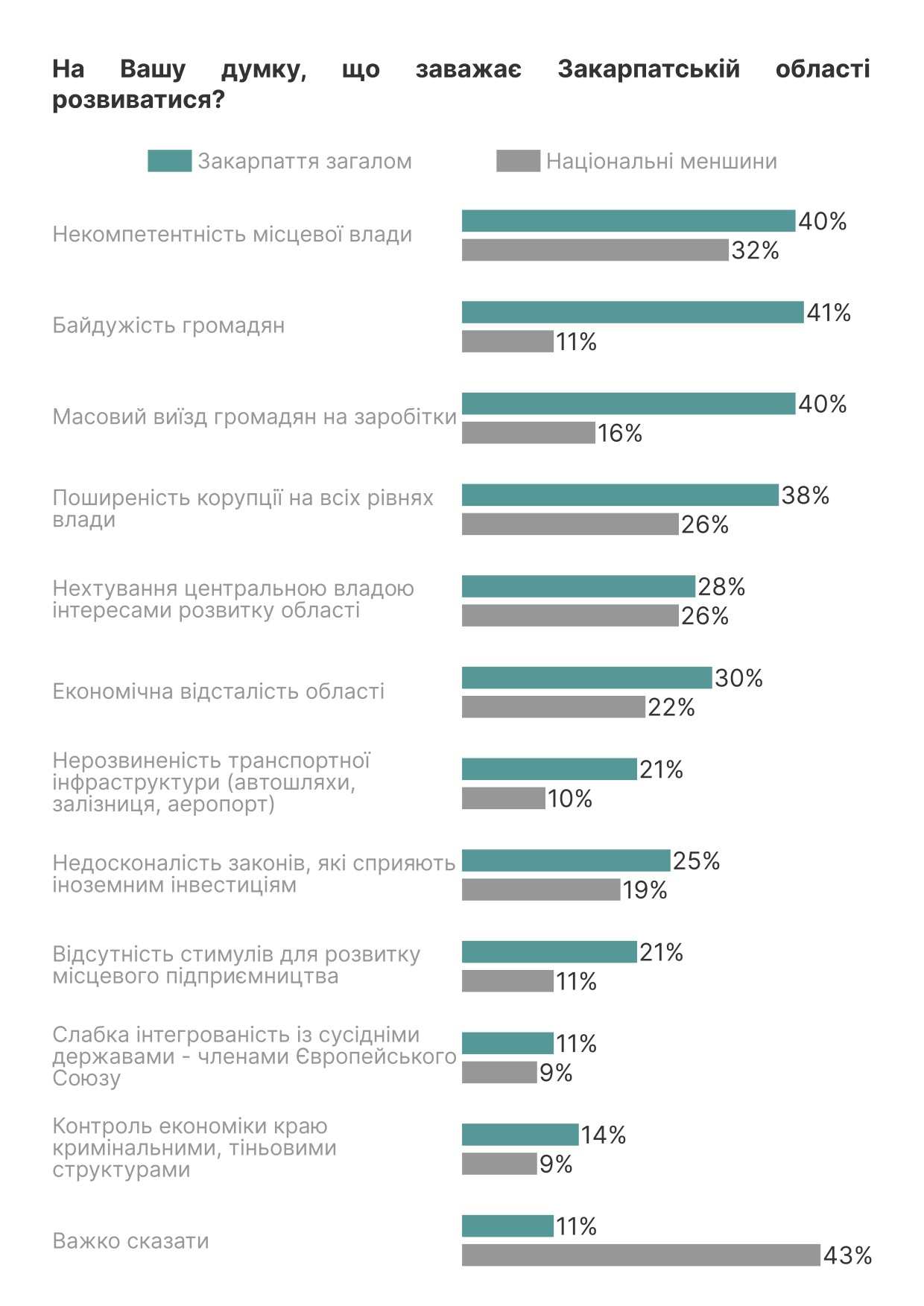
The main reasons preventing development in Transcarpathia are, first of all, the citizens’ unconcern, citizens moving abroad as migrant laborers, the incompetency of the local authorities and the spread of bribery at all levels of power. It should be noted that among representatives of national minorities in Transcarpathia, there is a much higher share of persons not being able to answer the question, which proves to their low involvement into the discussion on the regional problems. Besides, among the national minorities replies related to unconcern of the citizens and labor migration occurred less often.
ATTITUDE TO THE DECENTRALIZATION
Generally speaking, the negative ideas regarding the decentralization prevail over positive esteems of the results of the process. Thus, a speedup in abandoning villages and townships and local power brokers appearing were more common replies among the respondents as compared to positive responses, such as “new opportunities to influence the government appearing for people” and “the quality of service for citizens improving”. There are also significant divergencies in the responses from the representatives of the national minorities. Thus, among these esteems regarding the desolation in villages and townships and new ways to influence the authorities occur much more seldom. At the same time, representatives of the national minorities express their fears of probable local power brokers appearing as a result of the decentralization process.
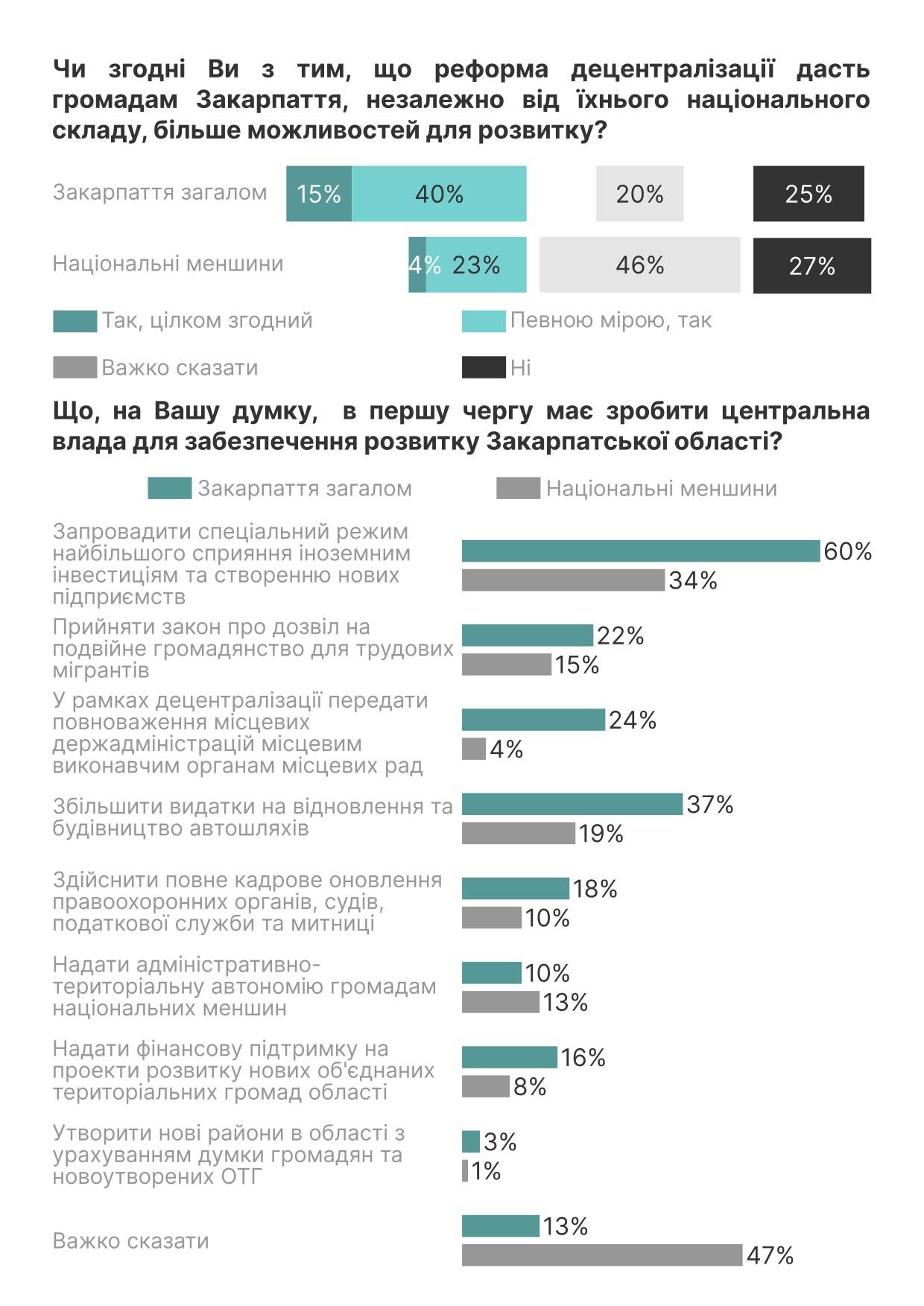
Despite a tendency with respondents to support negative theses regarding the decentralization more often than the positive ones, still the majority of the population of Transcarpathia agree to the point that the decentralization reform is going to give more opportunities for development to the communities of Transcarpathia, irrespective of their national composition. Among representatives of the national minorities there are some divergencies in their responses, in particular, a great share of respondents could not answer this question. This is to raise the issue of the quality of the state communicational policy, in particular, when it comes to explaining the essence of the decentralization to representatives of national minorities.
If it were for respondents to distribute the local budget, then most of them would assign funds first of all to building and maintenance of the infrastructure, stimulating and developing in economics, raising the social transfers and improving wages in the budget section, as well as for transfers to the national minorities.
The idea on establishing a special investment mode in the region gets a high support among the residents of the Transcarpathian region (60%). The idea of increasing expenses on restoring and building of highways. At the same time, although some 22% speak of necessity to adopt the law permitting double citizenship for the labor migrants, still we cannot say that this issue troubles a larger part of the region residents.
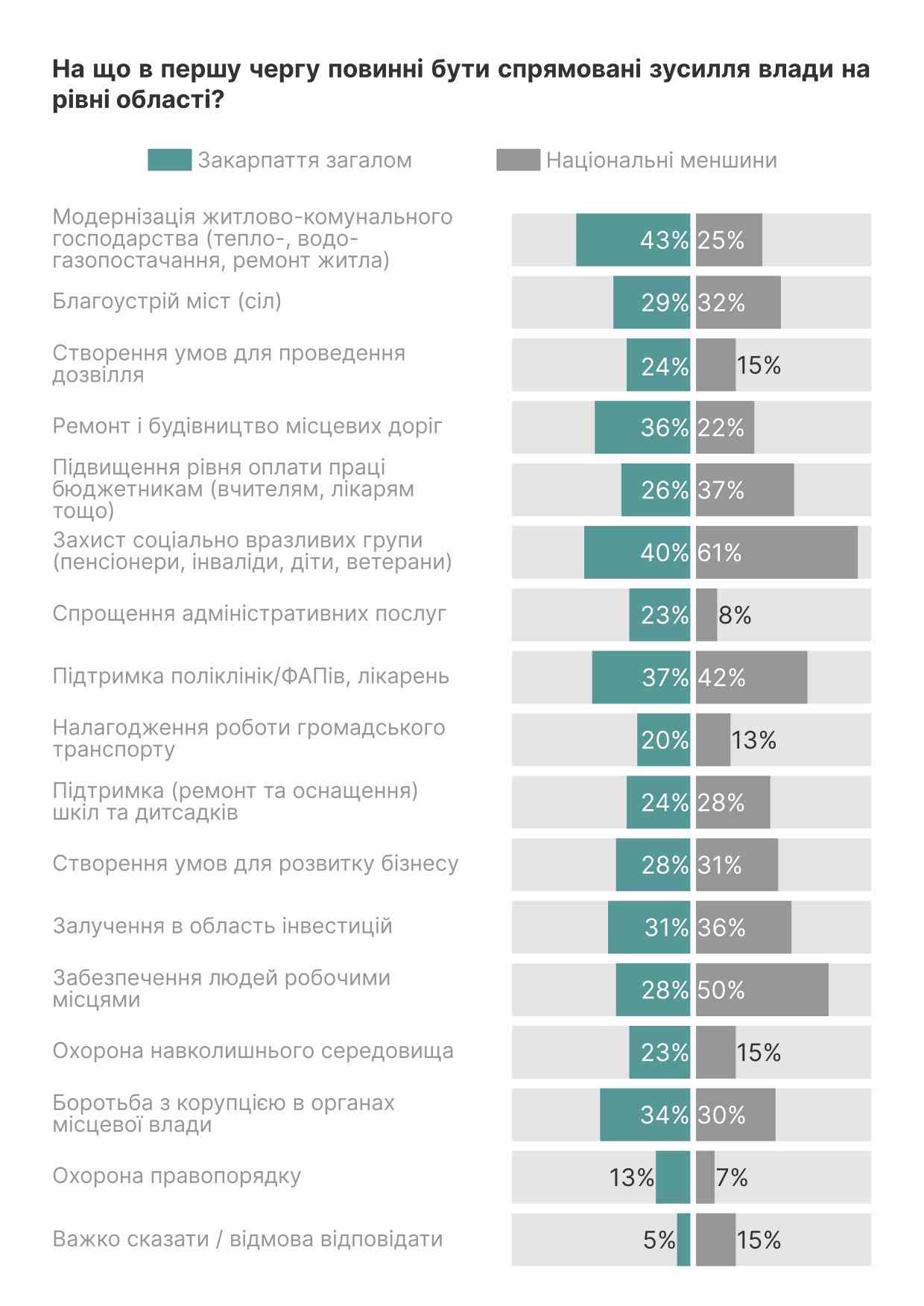
The regional authorities should focus their efforts first of all at an update of the housing and municipal enterprises (43%); at protection of vulnerable communities (40%); support of polyclinics, rural health posts and hospitals (37%); roads maintenance and building (35%) and anticorruption efforts in the bodies of local administration (34%). The national minorities show more interest in social services from the regional government. This refers to a higher priority in the protection of the vulnerable communities (61%); providing employment to people (50%); increasing the remuneration rate for state employees (37%).
Although negative esteems regarding the decentralization processes prevail, the share of Transcarpathians considering they have an impact on decision making in their habitat. Thus, in 2018 the share of those who had at least some impact made 21%, while now they are almost 39%. At the same time, among representatives of the national minorities, the feeling of having an impact to decision making is less spread – up to 15%.
A larger part of Transcarpathians condone unreported employment and/or smuggling. Thus, a rather positive attitude to those is with some 26%; a negative one is with 37%. For the rest it does not matter or have no opinion about it. At the same time, in the national minorities environment some 32% condone for the events, and only 17% have a negative attitude to them.
As compared to 2018, the share of Transcarpathians in favor of on only language of study both at school and universities and colleges has significantly increased. Thus, they are almost 50%. Yet another 30% consider that at primary school teaching can be done in the language of a national minority and in Ukrainian only at high school and universities, while still 8% are of the opinion that Ukrainian must be the mandatory language of study at universities only. In 2018 those considering that teaching must be in Ukrainian both for the secondary education had 28% of responses and another 31% thought that teaching in the language of a national minority may be done at the primary school.
At the same time, the most popular position among representatives of the national minorities is that the language of study at the primary school may be that of a national minority and at high school and universities it must be Ukrainian only (35%). Only 5% of the pollees among representatives of the national minorities think that both at school and in higher educational institutions studying in the language of a national minority is possible.
Migration moods
A vast majority of Transcarpathians have come across the issue of labor migration. Thus, some 17% of the respondents have relatives or close friends that have moved abroad for full-time residence. With another 40% they have moved to work for a long period of time. And on the whole, before the COVID-19 pandemic yet the same share of people had relatives or friends that have moved to work for a short time.
Migration still remains one of Transcarpathia’s main problems. Thus, almost 7% of respondents (and 11% among representatives of the national minorities) are considering leaving Ukraine and are even making some steps forward to it. Another 42% have also considered it but made no efforts. And only 51% have never thought of migration at all. As compared to 2018, the share of people that have at least pondered on migration has grown from the 28% to 49%.
Another evidence of the increase of migration moods is the fact that the number of choices for the reasons of migration has grown, too. Thus, the following probable reasons for migration have grown: social and economic reasons, non-compliance of the human rights, an opportunity to receive another citizenship, the beginning of the war, relatives settling down abroad etc. Instead, the share of the persons that have no intention to move under any circumstances has decreased from 46% to some 34%. The reasons for the increase in the migration moods are currently indistinctive and may be explained by the COVID-19 pandemic and the lockdown, both in the region and in various parts of the world.
A public opinion survey does not fix a support for separatism or federalist movements. Thus, only about 3% advocate for federalization, and less than 1% support separatism. Such indicators have actually not changed since the time of the previous polling. At the same time, the backup of the point concerning staying a part of the unitary Ukraine with broader powers for local councils and communities in the field of distribution and assigning the budget funds is increasing, which is a general trend for the decentralization processes. Among the pollees from the national minorities, separatism and federalism is not supported either (2% and 5% respectively).
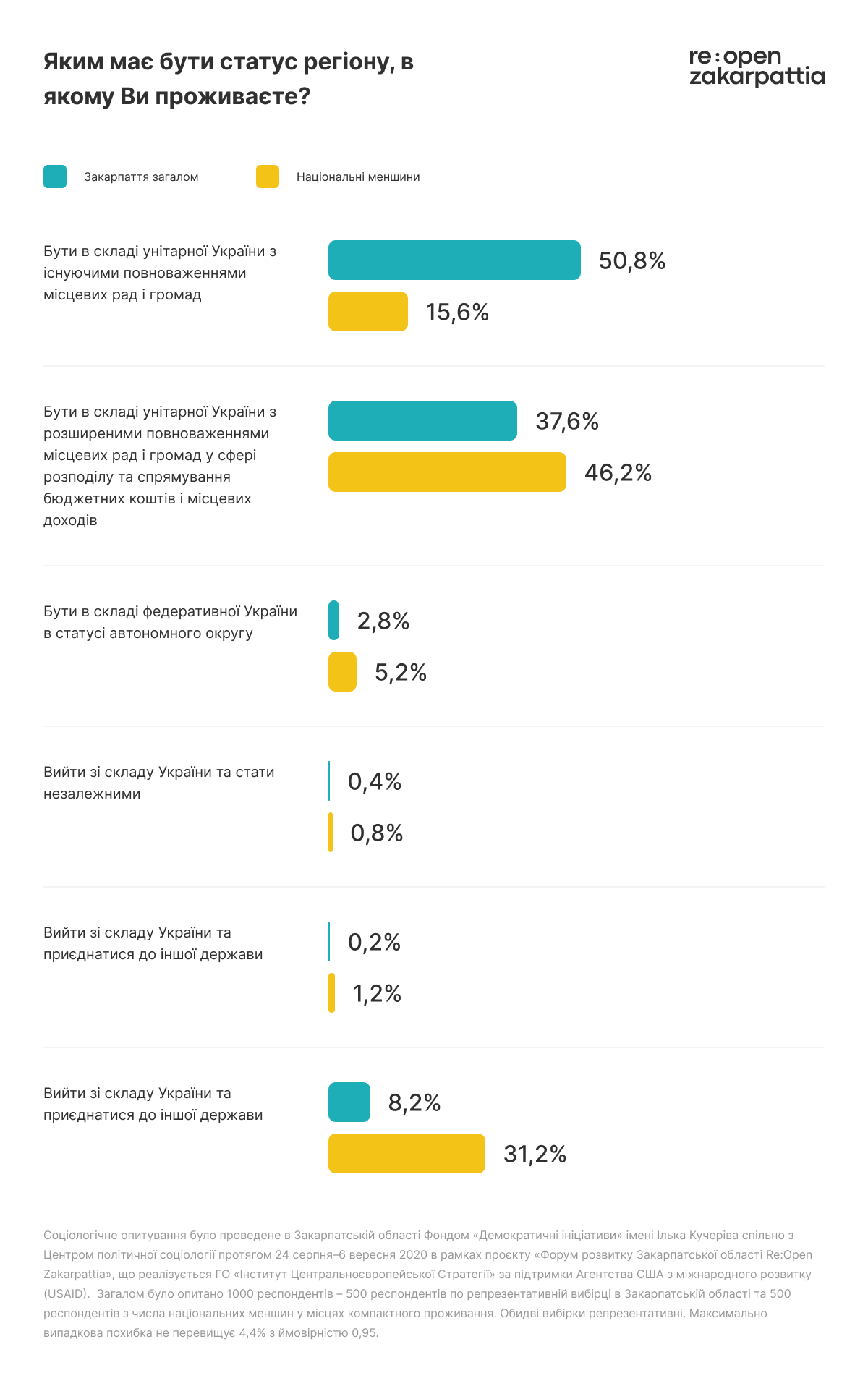
Foreign policy focus
An overwhelming majority of Transcarpathians have a non-competitive support for integration with the European Union, the same as representatives of the national minorities. However, among the latter in the region a support can be traced for the Customs Union of Russia, Belarus and Kazakhstan (own name Quazakstan since 2018), with some 7%.
Similarly, actually a zero option is the movement for securing safety via joining the NATO. The military union with Russia and other countries of the CIS is supported by less than a 1% of the pollees (less than 3% among representatives of the national minorities), and those in favor of a non-aligned status make up some 18%. The number of fence-sitters is 18% of the whole population and 37% for the national minorities.
The main motivation for receiving a foreign passport for residents of Transcarpathia is a possibility to get employment abroad and for full-time residence in another country. Among the national minorities this motivation is more visible, with 9 out of 10 pollees states for a possible employment.
Most of Transcarpathians are against the idea of a double citizenship, i.e. 53%. At the same time, there is quite a large share in favor of this probable decision, 34% namely. As for representatives of the national minorities, we may observe quite a different picture: over a half of the pollees support a probable double citizenship, while only 12% are against it.
Consumption of information
Television remains the major contributor of information for a majority of the residents of Transcarpathia. It was indicated as a usual source of receiving info by some 77% of respondents. Ukrainian sites serve for obtaining info for 41% of the pollees, and for 36% it is the Facebook. Foreign TV channels are also popular and have 23% (with 57% among national minorities). It should be noted that with representatives of national minorities it is more often to get info from the Russian TV and the Internet.
Most of respondents are in favor for their children to study English as a major language of international communication, apart from their native language (47%). German is also popular, with 14%, and Hungarian, with 11%. Within the environment of the national minorities English also prevails, with 51%, and some 14% of respondents speak of a necessity for their children to study Ukrainian.
Generally, a high level of tolerance to representatives of various nationalities is observed in Transcarpathia. Thus, among esteems there is a relatively great number of negative ones only about Russians (which may be explained by the war) and Roma. However, even for these ethical groups the quantitative indicator of dislike does not exceed 13%.
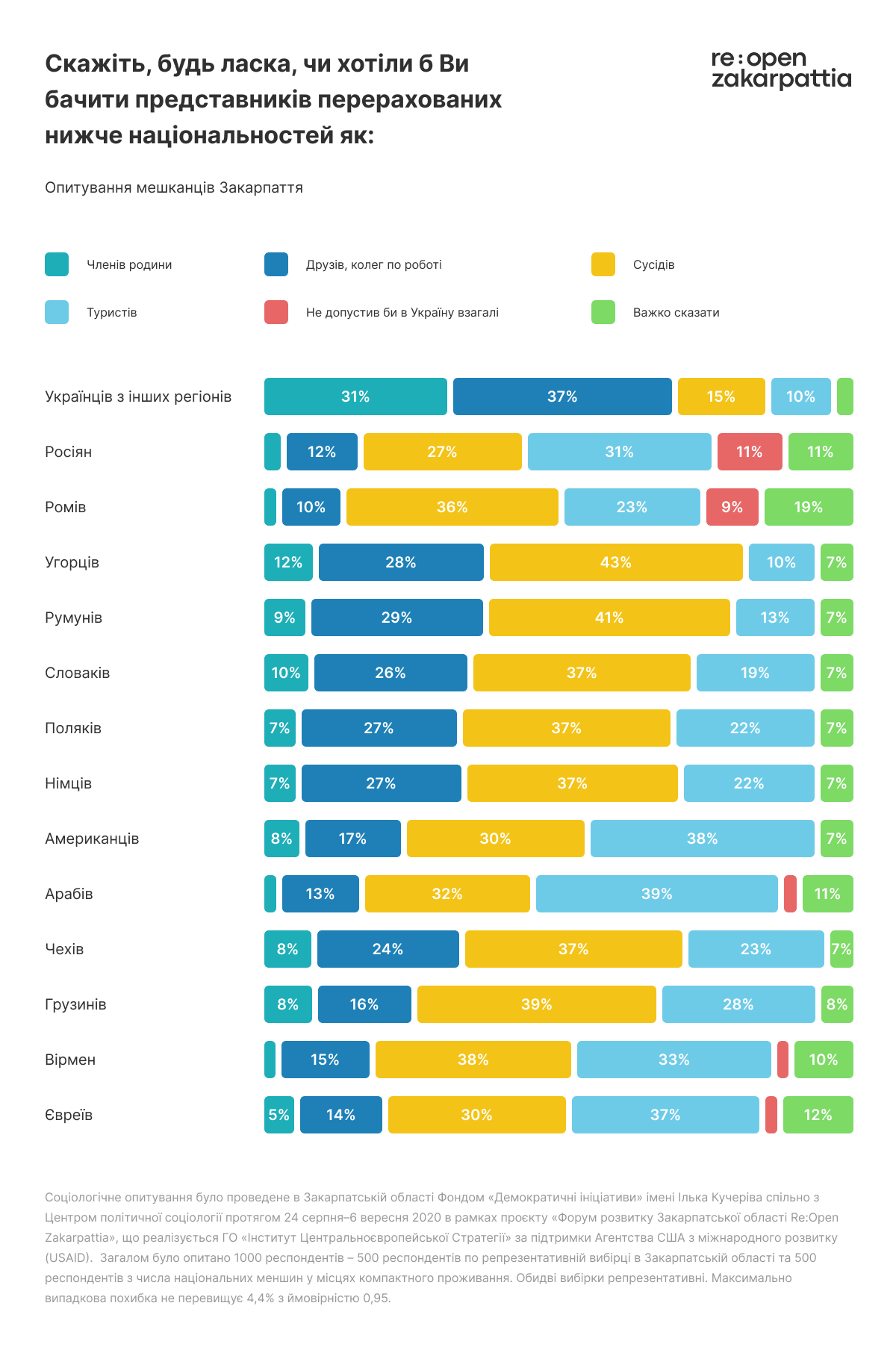
The situation is somewhat worse with tolerance among representatives of national minorities of Transcarpathia. Thus, relatively high indicators of zero tolerance are fixed towards Roma (24%) and Arabs (19%). Tolerance towards Russians and Americans shows some worse indicators (11% and 8%, respectively).
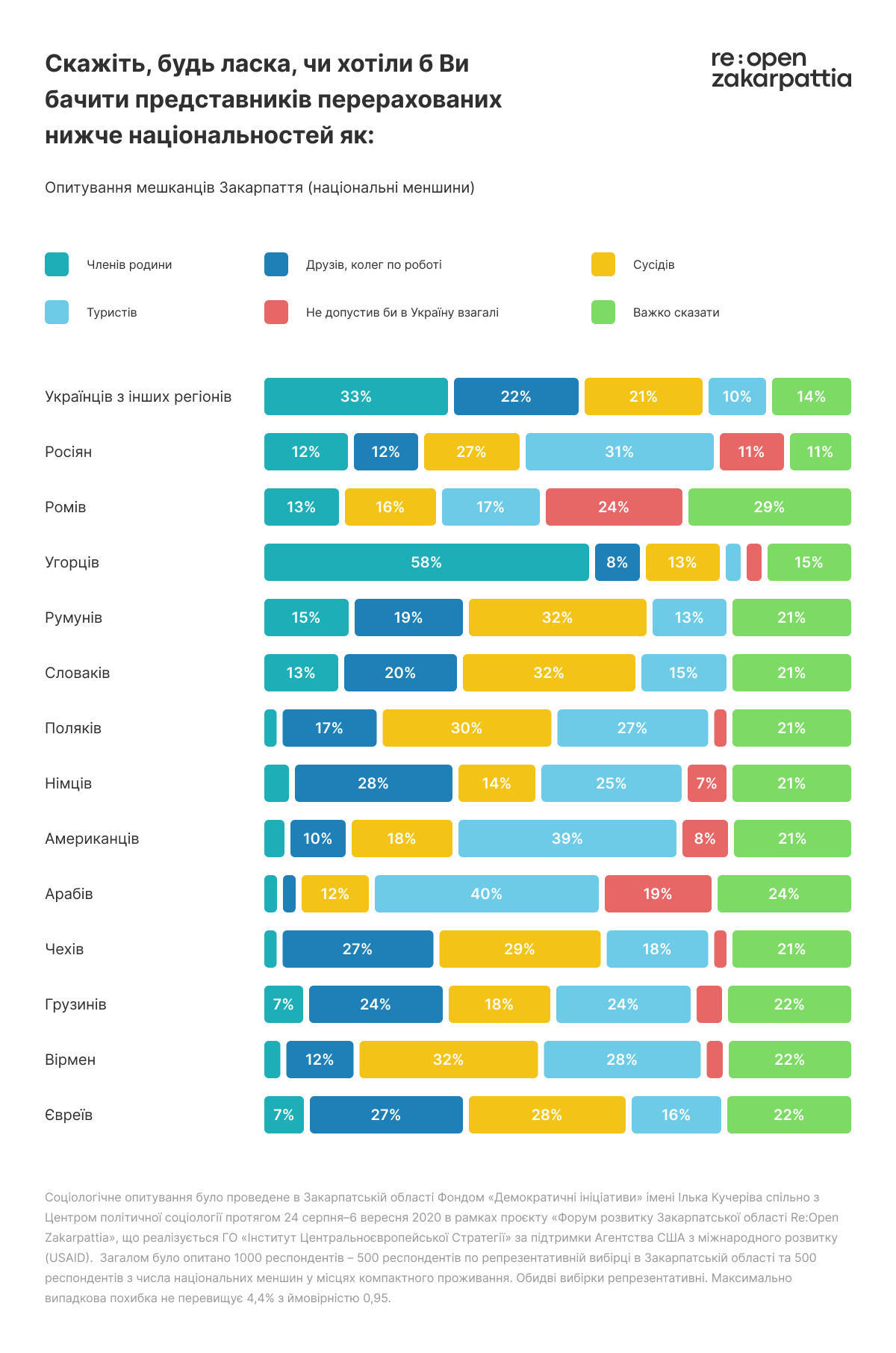
The spread of myths concerning the COVID-19 pandemic is highly worrying. Thus, only 39% (and 25% among national minorities) consider the coronavirus pandemic an outbreak of a dangerous infective disease, similar to epidemics that have occurred with the humanity before. At the same time, some 25% consider it a common type of influenza, and yet 14% are of the opinion that the coronavirus is a conspiracy aimed at controlling the world. Moreover, 7% of the respondents (and 16% among the national minorities) think that no coronavirus ever exists, and the pandemic is a total fiction and fraud.
Support for the integration with the EU with further joining it (hypothetically) is related with the expectations for an improvement in the quality of life due to the EU membership (53%). Other expectations are that being a member of the EU will facilitate for a better control of corruption (34%) and will provide possibilities to move abroad freely.
The attitude towards possible compromises the sake of settling down the military conflict at Donbass does not differ fundamentally from general opinions over the country. Most of the pollees are of the opinion that we have to meet half-way for the sake of peace, however there must be some limits to such negotiations. Only 12% of Transcarpathians are ready to agree for anything for peace.
A relative majority of the pollees also support the point of view that the ORDLO territory (isolated districts of the Donetsk and Luhansk regions) have to become a per of Ukraine again on the same conditions as before (45%). Another 28% of the pollees are ready to admit allotting a status of a special territory to the areas, i.e. giving more independence from the central government. Less than 5% state for separating the areas in a definite format. As for the national minorities, there are no significant differences except for a greater number of respondents that could not answer the question.
The present content has been presented by the public foundation “Institute of Central European Strategy” supported by the USA Agency on international development (USAID). The details of the content is a sole responsibility of the above Institute and may not necessarily represent USAID’s point of view or that of the USA Government. Reproduction and using of any part of this content in any format, including the graphical or electronic one, copying or using in any other way without a relevant link to the original source is prohibited.




